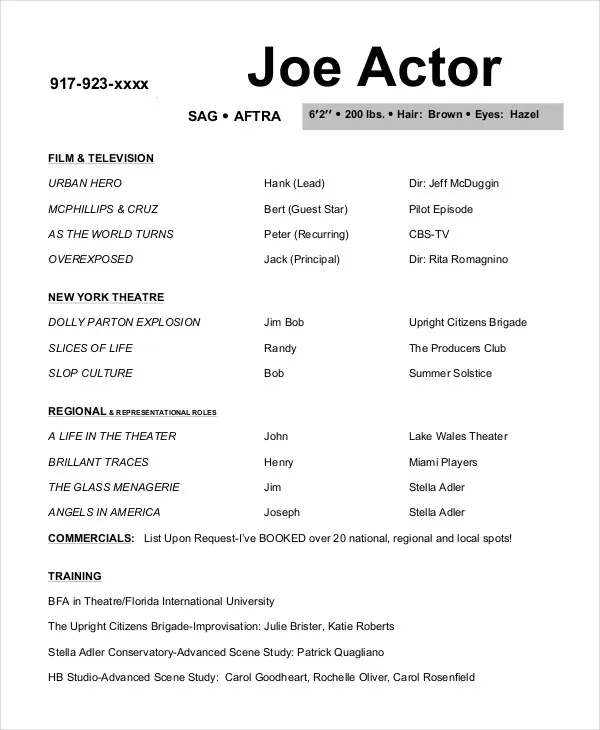When you’re just starting out as an actor, it can be challenging to think of ways to stand out from the crowd. Most casting directors look at resumes quickly, so unless you have some experience as a model or another type of performer, putting your resume online and sending copies to agents isn’t usually enough to get you auditions. There is no one right way to list commercial acting credits on an acting resume; however, some strategies work better than others, depending on the specific industry in which you are trying to land a role. If you want to include commercial parts on your resume but aren’t sure where they fit best, read on for information about how and where to list them.
Read Also: What to wear for a commercial audition?
What to Include When Listing Commercial Credits
There are a few critical pieces of information that casting directors need to know when you list commercial acting credits on your acting resume. First, you will want to include the name of the company for which you worked. Websites like IMDB Pro can be helpful, but you can also often find this information on their printed materials (e.g., coffee cups or napkins) or in news articles about the ad if it is particularly noteworthy. You’ll also want to include the type of advertisement you were in. Was it for a product you used, like a specific type of coffee or soda? Or was it for a product you don’t use, like a cellphone service or a sports car brand? Some companies have multiple ads, so you’ll want to specify the one you were in. You can also add the type of product if you wish.
How to List a Commercial on an Acting Resume
There are a couple of ways you can list a commercial on an acting resumé. The first is to simply write “Advertisement: Coca-Cola” or “Advertisement: Ford” at the top of the page where your commercial credits are listed. This is the simplest way to list commercial credits, but it lists them in a way that doesn’t tell the reader anything. If you are trying to get a specific commercial work, this isn’t the best way to list commercial acting credits on your acting resume.
Read Also: What does an Actor's Resume Look Like
How to List a Print Ad on an Acting Resume
If you were in a print ad, you’d want to list it differently than in a commercial. You should still include the name of the company and the name of the product (if it wasn’t a product you used) with the title “Advertisement: [Name of product]”. For example, if you were in a print ad for a car dealership, your credit should read, “Advertisement: Bob’s Used Cars”. If the ad was for a product you used, you could list it as “Advertisement: [Name of product] by [Name of person].” For example, if you were in a print ad for a clothing company, your credit should read, “Advertisement: [Name of product] by [Name of person].”
How to List a Commercial on-screen
If your commercial featured you on-screen, you could list it as “Advertisement: [Name of product] on-screen”. This works well for commercials where you stand next to an actor using the product. This is also a good option for print ads that feature you on-screen.
What to Include When Listing TV Shows and Movies
If you have TV or movie credits on your acting resume, you’ll want to include the title of the program/movie, the name of the network or studio that produced it, and the date it was released. You can also include your character’s name if it’s a one-off role, but that’s not necessary. If you’re trying to get work in a particular industry, like film or television, you should list the credits in a way that makes the industry clear. So, if you have a feature film and a few episodes of a TV show, you would list them as “Feature Film: Title of Film” and “TV Show: Name of TV Show”.
Read Also: How Old do You Have to be a Scare Actor
Can you put extra work on your acting resume?
Some actors choose to add other things to their acting resumes, like modeling or hosting events. While this can help generate work, it’s unnecessary to list these things on your acting resume. If you’ve done a few modeling gigs or hosted some events, you can add a short note at the bottom of the page to indicate this. However, if you have a lot of other credits, it’s a good idea to create a separate page for them, so they don’t clutter up your acting resume.
Conclusion
Actors often get asked how they landed their first role, and if you don’t have much acting experience, listing commercial credits on your acting resume is a great way to tell that story. At the same time, commercial credits are easy to obtain and don’t require any sort of formal training. Because of this, commercial acting credits are a great way to pad your resume and demonstrate that you have experience in the industry. When you list commercial acting credits on your acting resume, keep the information simple and provide enough information for readers to understand the role.
When you’re just starting out as an actor, it can be challenging to think of ways to stand out from the crowd. Most casting directors look at resumes quickly, so unless you have some experience as a model or another type of performer, putting your resume online and sending copies to agents isn’t usually enough to get you auditions. There is no one right way to list commercial acting credits on an acting resume; however, some strategies work better than others, depending on the specific industry in which you are trying to land a role. If you want to include commercial parts on your resume but aren’t sure where they fit best, read on for information about how and where to list them.
Read Also: What to wear for a commercial audition?
What to Include When Listing Commercial Credits
 There are a few critical pieces of information that casting directors need to know when you list commercial acting credits on your acting resume. First, you will want to include the name of the company for which you worked. Websites like IMDB Pro can be helpful, but you can also often find this information on their printed materials (e.g., coffee cups or napkins) or in news articles about the ad if it is particularly noteworthy. You’ll also want to include the type of advertisement you were in. Was it for a product you used, like a specific type of coffee or soda? Or was it for a product you don’t use, like a cellphone service or a sports car brand? Some companies have multiple ads, so you’ll want to specify the one you were in. You can also add the type of product if you wish.
There are a few critical pieces of information that casting directors need to know when you list commercial acting credits on your acting resume. First, you will want to include the name of the company for which you worked. Websites like IMDB Pro can be helpful, but you can also often find this information on their printed materials (e.g., coffee cups or napkins) or in news articles about the ad if it is particularly noteworthy. You’ll also want to include the type of advertisement you were in. Was it for a product you used, like a specific type of coffee or soda? Or was it for a product you don’t use, like a cellphone service or a sports car brand? Some companies have multiple ads, so you’ll want to specify the one you were in. You can also add the type of product if you wish.
How to List a Commercial on an Acting Resume

There are a couple of ways you can list a commercial on an acting resumé. The first is to simply write “Advertisement: Coca-Cola” or “Advertisement: Ford” at the top of the page where your commercial credits are listed. This is the simplest way to list commercial credits, but it lists them in a way that doesn’t tell the reader anything. If you are trying to get a specific commercial work, this isn’t the best way to list commercial acting credits on your acting resume.
Read Also: What does an Actor’s Resume Look Like
How to List a Print Ad on an Acting Resume
If you were in a print ad, you’d want to list it differently than in a commercial. You should still include the name of the company and the name of the product (if it wasn’t a product you used) with the title “Advertisement: [Name of product]”. For example, if you were in a print ad for a car dealership, your credit should read, “Advertisement: Bob’s Used Cars”. If the ad was for a product you used, you could list it as “Advertisement: [Name of product] by [Name of person].” For example, if you were in a print ad for a clothing company, your credit should read, “Advertisement: [Name of product] by [Name of person].”
How to List a Commercial on-screen
If your commercial featured you on-screen, you could list it as “Advertisement: [Name of product] on-screen”. This works well for commercials where you stand next to an actor using the product. This is also a good option for print ads that feature you on-screen.
What to Include When Listing TV Shows and Movies
If you have TV or movie credits on your acting resume, you’ll want to include the title of the program/movie, the name of the network or studio that produced it, and the date it was released. You can also include your character’s name if it’s a one-off role, but that’s not necessary. If you’re trying to get work in a particular industry, like film or television, you should list the credits in a way that makes the industry clear. So, if you have a feature film and a few episodes of a TV show, you would list them as “Feature Film: Title of Film” and “TV Show: Name of TV Show”.
Read Also: How Old do You Have to be a Scare Actor
Can you put extra work on your acting resume?
Some actors choose to add other things to their acting resumes, like modeling or hosting events. While this can help generate work, it’s unnecessary to list these things on your acting resume. If you’ve done a few modeling gigs or hosted some events, you can add a short note at the bottom of the page to indicate this. However, if you have a lot of other credits, it’s a good idea to create a separate page for them, so they don’t clutter up your acting resume.
Conclusion
Actors often get asked how they landed their first role, and if you don’t have much acting experience, listing commercial credits on your acting resume is a great way to tell that story. At the same time, commercial credits are easy to obtain and don’t require any sort of formal training. Because of this, commercial acting credits are a great way to pad your resume and demonstrate that you have experience in the industry. When you list commercial acting credits on your acting resume, keep the information simple and provide enough information for readers to understand the role.
